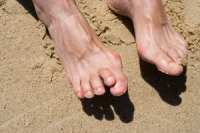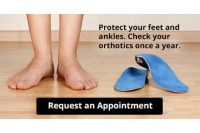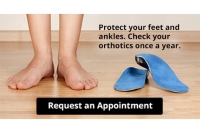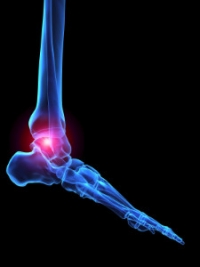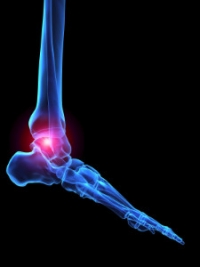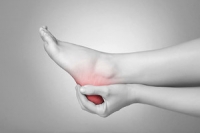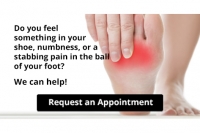
Blog (787)
How Does Hammertoe Occur?
 The second and third toes may be impacted by the medical condition that is known as hammertoe. The toe bends at the joint in an upward position, and often resembles a hammer. It is considered to be a deformity, and in severe cases, surgery may be necessary to permanently straighten the toes.There are two stages of hammertoe. When this condition is first noticed, the joints can be flexible, and relief may be found when the correct shoes are worn. Additionally, there are specific stretches that can be performed which may help to strengthen the toes. When the condition becomes more severe, it is referred to as rigid hammertoe, and the joints are unable to move. A common reason why this condition may develop can consist of wearing shoes that do not have adequate room for the toes to move freely in. Additionally, genetic factors may lead to developing hammertoe. Please consult with a podiatrist who can properly diagnose this ailment, and suggest treatment options that are correct for you.
The second and third toes may be impacted by the medical condition that is known as hammertoe. The toe bends at the joint in an upward position, and often resembles a hammer. It is considered to be a deformity, and in severe cases, surgery may be necessary to permanently straighten the toes.There are two stages of hammertoe. When this condition is first noticed, the joints can be flexible, and relief may be found when the correct shoes are worn. Additionally, there are specific stretches that can be performed which may help to strengthen the toes. When the condition becomes more severe, it is referred to as rigid hammertoe, and the joints are unable to move. A common reason why this condition may develop can consist of wearing shoes that do not have adequate room for the toes to move freely in. Additionally, genetic factors may lead to developing hammertoe. Please consult with a podiatrist who can properly diagnose this ailment, and suggest treatment options that are correct for you.
Hammertoes can be a painful condition to live with. For more information, contact Dr. Kenneth Donovan of Advanced Care Foot and Ankle. Our doctor will answer any of your foot- and ankle-related questions.
Hammertoe
Hammertoe is a foot deformity that occurs due to an imbalance in the muscles, tendons, or ligaments that normally hold the toe straight. It can be caused by the type of shoes you wear, your foot structure, trauma, and certain disease processes.
Symptoms
- Painful and/or difficult toe movement
- Swelling
- Joint stiffness
- Calluses/Corns
- Physical deformity
Risk Factors
- Age – The risk of hammertoe increases with age
- Sex – Women are more likely to have hammertoe compared to men
- Toe Length – You are more likely to develop hammertoe if your second toe is longer than your big toe
- Certain Diseases – Arthritis and diabetes may make you more likely to develop hammertoe
Treatment
If you have hammertoe, you should change into a more comfortable shoe that provides enough room for your toes. Exercises such as picking up marbles may strengthen and stretch your toe muscles. Nevertheless, it is important to seek assistance from a podiatrist in order to determine the severity of your hammertoe and see which treatment option will work best for you.
If you have any questions, please feel free to contact one of our offices located in Warren, Livingston, and Toms River, NJ . We offer the newest diagnostic and treatment technologies for all your foot care needs.
Reminder: When Was the Last Time…?
Reminder: When Was the Last Time...?
Rheumatoid Arthritis and the Feet
Rheumatoid arthritis is an inflammatory form of arthritis that can create complications with the feet. This condition may cause swelling within the joints of the feet, making it very painful to complete daily tasks. Other symptoms include joint stiffness, fatigue, muscle pain, and numbness. Some risk factors for developing rheumatoid arthritis include genetics, bacteria and viruses, physical trauma, and obesity. In order to treat this condition, it may be beneficial to visit a doctor for prescribed medication, partake in physical therapy, and in more severe cases, surgery. It’s been said that having a well balanced diet may help relieve some of the symptoms associated with this condition. For a proper diagnosis and advised treatment plan, it’s suggested that you consult with a podiatrist for professional care.
Arthritis can be a difficult condition to live with. If you are seeking treatment, contact Dr. Kenneth Donovan from Advanced Care Foot and Ankle. Our doctor can provide the care you need to keep you pain-free and on your feet.
Arthritic Foot Care
Arthritis is a joint disorder that involves the inflammation of different joints in your body, such as those in your feet. Arthritis is often caused by a degenerative joint disease and causes mild to severe pain in all affected areas. In addition to this, swelling and stiffness in the affected joints can also be a common symptom of arthritis.
In many cases, wearing ill-fitting shoes can worsen the effects and pain of arthritis. Wearing shoes that have a lower heel and extra room can help your feet feel more comfortable. In cases of rheumatoid arthritis, the arch in your foot may become problematic. Buying shoes with proper arch support that contour to your feet can help immensely.
Alleviating Arthritic Pain
- Exercises that stretch the foot can prevent further pain and injury and increase mobility
- Most of the pain can be alleviated with anti-inflammatory drugs, heat, and topical medications
- Massages can help temporarily alleviate pain.
It is best to see your doctor for the treatment that is right for your needs and symptoms. Conditions vary, and a podiatrist can help you determine the right method of care for your feet.
If you have any questions, please feel free to contact one of our offices located in Warren, Livingston, and Toms River, NJ . We offer the newest diagnostic tools and technology to treat your foot and ankle needs.
Rheumatoid Arthritis and the Feet
 Rheumatoid arthritis is an inflammatory form of arthritis that can create complications with the feet. This condition may cause swelling within the joints of the feet, making it very painful to complete daily tasks. Other symptoms include joint stiffness, fatigue, muscle pain, and numbness. Some risk factors for developing rheumatoid arthritis include genetics, bacteria and viruses, physical trauma, and obesity. In order to treat this condition, it may be beneficial to visit a doctor for prescribed medication, partake in physical therapy, and in more severe cases, surgery. It’s been said that having a well balanced diet may help relieve some of the symptoms associated with this condition. For a proper diagnosis and advised treatment plan, it’s suggested that you consult with a podiatrist for professional care.
Rheumatoid arthritis is an inflammatory form of arthritis that can create complications with the feet. This condition may cause swelling within the joints of the feet, making it very painful to complete daily tasks. Other symptoms include joint stiffness, fatigue, muscle pain, and numbness. Some risk factors for developing rheumatoid arthritis include genetics, bacteria and viruses, physical trauma, and obesity. In order to treat this condition, it may be beneficial to visit a doctor for prescribed medication, partake in physical therapy, and in more severe cases, surgery. It’s been said that having a well balanced diet may help relieve some of the symptoms associated with this condition. For a proper diagnosis and advised treatment plan, it’s suggested that you consult with a podiatrist for professional care.
Arthritis can be a difficult condition to live with. If you are seeking treatment, contact Dr. Kenneth Donovan from Advanced Care Foot and Ankle. Our doctor can provide the care you need to keep you pain-free and on your feet.
Arthritic Foot Care
Arthritis is a joint disorder that involves the inflammation of different joints in your body, such as those in your feet. Arthritis is often caused by a degenerative joint disease and causes mild to severe pain in all affected areas. In addition to this, swelling and stiffness in the affected joints can also be a common symptom of arthritis.
In many cases, wearing ill-fitting shoes can worsen the effects and pain of arthritis. Wearing shoes that have a lower heel and extra room can help your feet feel more comfortable. In cases of rheumatoid arthritis, the arch in your foot may become problematic. Buying shoes with proper arch support that contour to your feet can help immensely.
Alleviating Arthritic Pain
- Exercises that stretch the foot can prevent further pain and injury and increase mobility
- Most of the pain can be alleviated with anti-inflammatory drugs, heat, and topical medications
- Massages can help temporarily alleviate pain.
It is best to see your doctor for the treatment that is right for your needs and symptoms. Conditions vary, and a podiatrist can help you determine the right method of care for your feet.
If you have any questions, please feel free to contact one of our offices located in Warren, Livingston, and Toms River, NJ . We offer the newest diagnostic tools and technology to treat your foot and ankle needs.
Common Symptoms of Plantar Fasciitis
The band of tissue that connects the heel bone to the toes is known as the plantar fascia. If this tissue becomes inflamed, it’s likely the foot condition known as plantar fasciitis may develop. Plantar fasciitis can cause a great deal of heel pain for those affected. Early detection and prompt treatment can be helpful for a speedy recovery. There are a few signs to look out for if you believe you may have developed plantar fasciitis. If you are experiencing pain when you first step out of bed in the morning, when seated or standing for prolonged periods of time, or going up and down stairs, you may have plantar fasciitis. For a proper diagnosis and suggested plan of treatment, it’s suggested that you consult with a podiatrist.
Plantar fasciitis can be very painful and inconvenient. If you are experiencing heel pain or symptoms of plantar fasciitis, contact Dr. Kenneth Donovan from Advanced Care Foot and Ankle. Our doctor can provide the care you need to keep you pain-free and on your feet.
What Is Plantar Fasciitis?
Plantar fasciitis is the inflammation of the thick band of tissue that runs along the bottom of your foot, known as the plantar fascia, and causes mild to severe heel pain.
What Causes Plantar Fasciitis?
- Excessive running
- Non-supportive shoes
- Overpronation
- Repeated stretching and tearing of the plantar fascia
How Can It Be Treated?
- Conservative measures – anti-inflammatories, ice packs, stretching exercises, physical therapy, orthotic devices
- Shockwave therapy – sound waves are sent to the affected area to facilitate healing and are usually used for chronic cases of plantar fasciitis
- Surgery – usually only used as a last resort when all else fails. The plantar fascia can be surgically detached from the heel
While very treatable, plantar fasciitis is definitely not something that should be ignored. Especially in severe cases, speaking to your doctor right away is highly recommended to avoid complications and severe heel pain. Your podiatrist can work with you to provide the appropriate treatment options tailored to your condition.
If you have any questions please feel free to contact one of our offices located in Warren, Livingston, and Toms River, NJ . We offer the newest diagnostic and treatment technologies for all your foot and ankle needs.
Common Symptoms of Plantar Fasciitis
 The band of tissue that connects the heel bone to the toes is known as the plantar fascia. If this tissue becomes inflamed, it’s likely the foot condition known as plantar fasciitis may develop. Plantar fasciitis can cause a great deal of heel pain for those affected. Early detection and prompt treatment can be helpful for a speedy recovery. There are a few signs to look out for if you believe you may have developed plantar fasciitis. If you are experiencing pain when you first step out of bed in the morning, when seated or standing for prolonged periods of time, or going up and down stairs, you may have plantar fasciitis. For a proper diagnosis and suggested plan of treatment, it’s suggested that you consult with a podiatrist.
The band of tissue that connects the heel bone to the toes is known as the plantar fascia. If this tissue becomes inflamed, it’s likely the foot condition known as plantar fasciitis may develop. Plantar fasciitis can cause a great deal of heel pain for those affected. Early detection and prompt treatment can be helpful for a speedy recovery. There are a few signs to look out for if you believe you may have developed plantar fasciitis. If you are experiencing pain when you first step out of bed in the morning, when seated or standing for prolonged periods of time, or going up and down stairs, you may have plantar fasciitis. For a proper diagnosis and suggested plan of treatment, it’s suggested that you consult with a podiatrist.
Plantar fasciitis can be very painful and inconvenient. If you are experiencing heel pain or symptoms of plantar fasciitis, contact Dr. Kenneth Donovan from Advanced Care Foot and Ankle. Our doctor can provide the care you need to keep you pain-free and on your feet.
What Is Plantar Fasciitis?
Plantar fasciitis is the inflammation of the thick band of tissue that runs along the bottom of your foot, known as the plantar fascia, and causes mild to severe heel pain.
What Causes Plantar Fasciitis?
- Excessive running
- Non-supportive shoes
- Overpronation
- Repeated stretching and tearing of the plantar fascia
How Can It Be Treated?
- Conservative measures – anti-inflammatories, ice packs, stretching exercises, physical therapy, orthotic devices
- Shockwave therapy – sound waves are sent to the affected area to facilitate healing and are usually used for chronic cases of plantar fasciitis
- Surgery – usually only used as a last resort when all else fails. The plantar fascia can be surgically detached from the heel
While very treatable, plantar fasciitis is definitely not something that should be ignored. Especially in severe cases, speaking to your doctor right away is highly recommended to avoid complications and severe heel pain. Your podiatrist can work with you to provide the appropriate treatment options tailored to your condition.
If you have any questions please feel free to contact one of our offices located in Warren, Livingston, and Toms River, NJ . We offer the newest diagnostic and treatment technologies for all your foot and ankle needs.
Wearing Shoes That Can Protect The Feet While Working
There are several types of jobs that require employees to stand for the majority of the day. This can cause the feet to become tired, and it is beneficial to take necessary precautions that can help the feet to feel good. These can include wearing appropriate shoes that have adequate cushioning and support. It is beneficial to choose a non-slip sole to maintain traction, in addition to wearing shoes that are made of breathable materials. Research has indicated it is important to frequently perform gentle foot stretches that may help the feet to become strong, and this may diminish existing aches and pains. For more information about how the feet are affected from standing for extended periods of time during the day, please confer with a podiatrist.
While working on the feet, it is important to take the proper care of them. For more information about working on your feet, contact Dr. Kenneth Donovan from Advanced Care Foot and Ankle. Our doctor will treat your foot and ankle needs.
Working on Your Feet
Standing on your feet for long periods of time can cause stress and pain in your feet. Your whole body may experience change in terms of posture, back pain, bunions, callouses and or plantar warts. There are ways to avoid these conditions with proper foot care, smart choices and correct posture.
Positive Changes
Negative heeled shoe – Choosing this shoe type places the heel slightly lower than the ball of the foot. These are great for overall foot health. Find shoes that fit you correctly.
Go barefoot – Our feet were not designed to be enclosed for all hours of the day. Try to periodically expose your feet to air.
Eliminate Pain
Foot Exercises – Performing simple exercises, incorporating yoga and doing stretches are beneficial. This will allow increased blood flow to the area and muscles of the foot.
Achilles tendon – Stretching the foot out flat on the floor will relax the calf muscles and tendon. These exercises can be performed almost anywhere. Make sure you add these exercises to your daily regimen.
With a little bit of this information and knowing more about foot health, you will notice changes. Foot stretches and proper footwear will help with pain and prevent further issues.
If you have any questions please feel free to contact one of our offices located in Warren, Livingston, and Toms River, NJ . We offer the newest diagnostic and treatment technologies for all your foot and ankle needs.
Wearing Shoes That Can Protect The Feet While Working
 There are several types of jobs that require employees to stand for the majority of the day. This can cause the feet to become tired, and it is beneficial to take necessary precautions that can help the feet to feel good. These can include wearing appropriate shoes that have adequate cushioning and support. It is beneficial to choose a non-slip sole to maintain traction, in addition to wearing shoes that are made of breathable materials. Research has indicated it is important to frequently perform gentle foot stretches that may help the feet to become strong, and this may diminish existing aches and pains. For more information about how the feet are affected from standing for extended periods of time during the day, please confer with a podiatrist.
There are several types of jobs that require employees to stand for the majority of the day. This can cause the feet to become tired, and it is beneficial to take necessary precautions that can help the feet to feel good. These can include wearing appropriate shoes that have adequate cushioning and support. It is beneficial to choose a non-slip sole to maintain traction, in addition to wearing shoes that are made of breathable materials. Research has indicated it is important to frequently perform gentle foot stretches that may help the feet to become strong, and this may diminish existing aches and pains. For more information about how the feet are affected from standing for extended periods of time during the day, please confer with a podiatrist.
While working on the feet, it is important to take the proper care of them. For more information about working on your feet, contact Dr. Kenneth Donovan from Advanced Care Foot and Ankle. Our doctor will treat your foot and ankle needs.
Working on Your Feet
Standing on your feet for long periods of time can cause stress and pain in your feet. Your whole body may experience change in terms of posture, back pain, bunions, callouses and or plantar warts. There are ways to avoid these conditions with proper foot care, smart choices and correct posture.
Positive Changes
Negative heeled shoe – Choosing this shoe type places the heel slightly lower than the ball of the foot. These are great for overall foot health. Find shoes that fit you correctly.
Go barefoot – Our feet were not designed to be enclosed for all hours of the day. Try to periodically expose your feet to air.
Eliminate Pain
Foot Exercises – Performing simple exercises, incorporating yoga and doing stretches are beneficial. This will allow increased blood flow to the area and muscles of the foot.
Achilles tendon – Stretching the foot out flat on the floor will relax the calf muscles and tendon. These exercises can be performed almost anywhere. Make sure you add these exercises to your daily regimen.
With a little bit of this information and knowing more about foot health, you will notice changes. Foot stretches and proper footwear will help with pain and prevent further issues.
If you have any questions please feel free to contact one of our offices located in Warren, Livingston, and Toms River, NJ . We offer the newest diagnostic and treatment technologies for all your foot and ankle needs.
